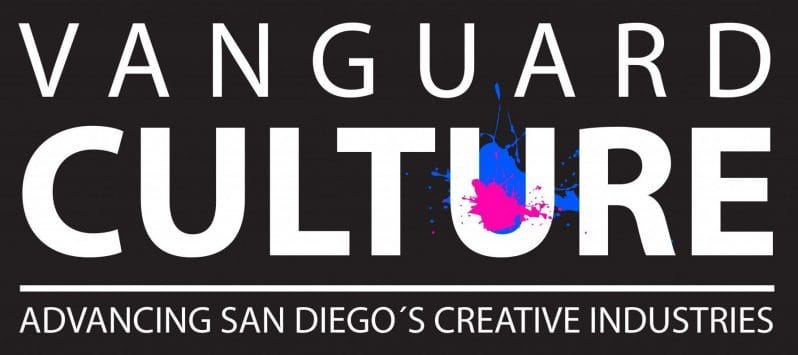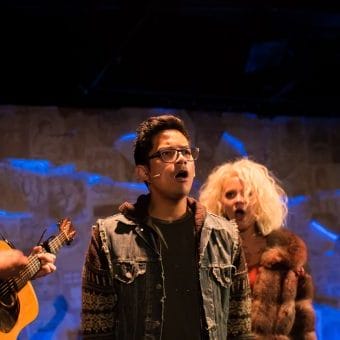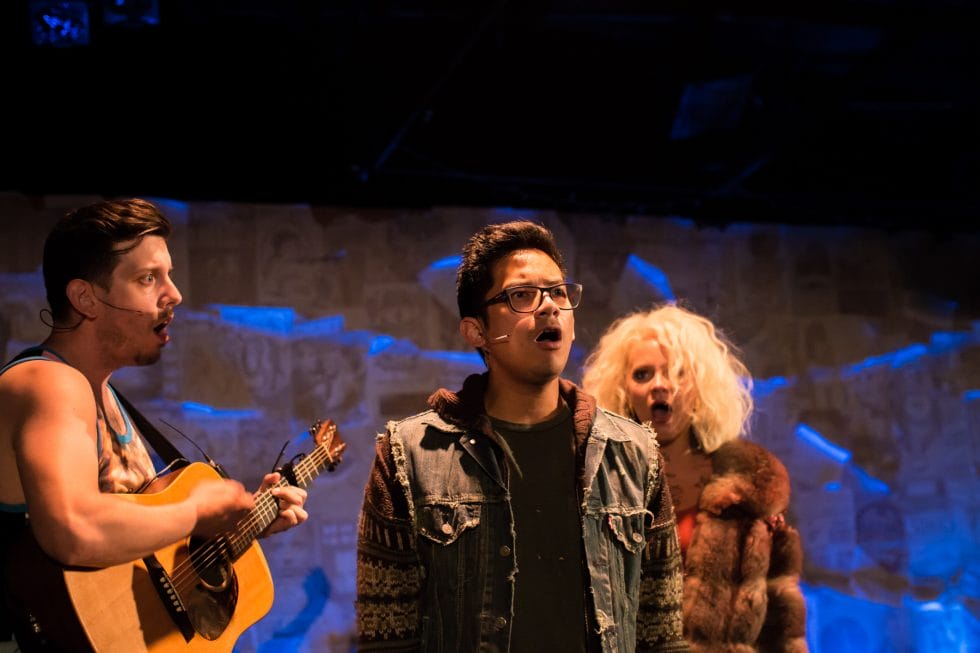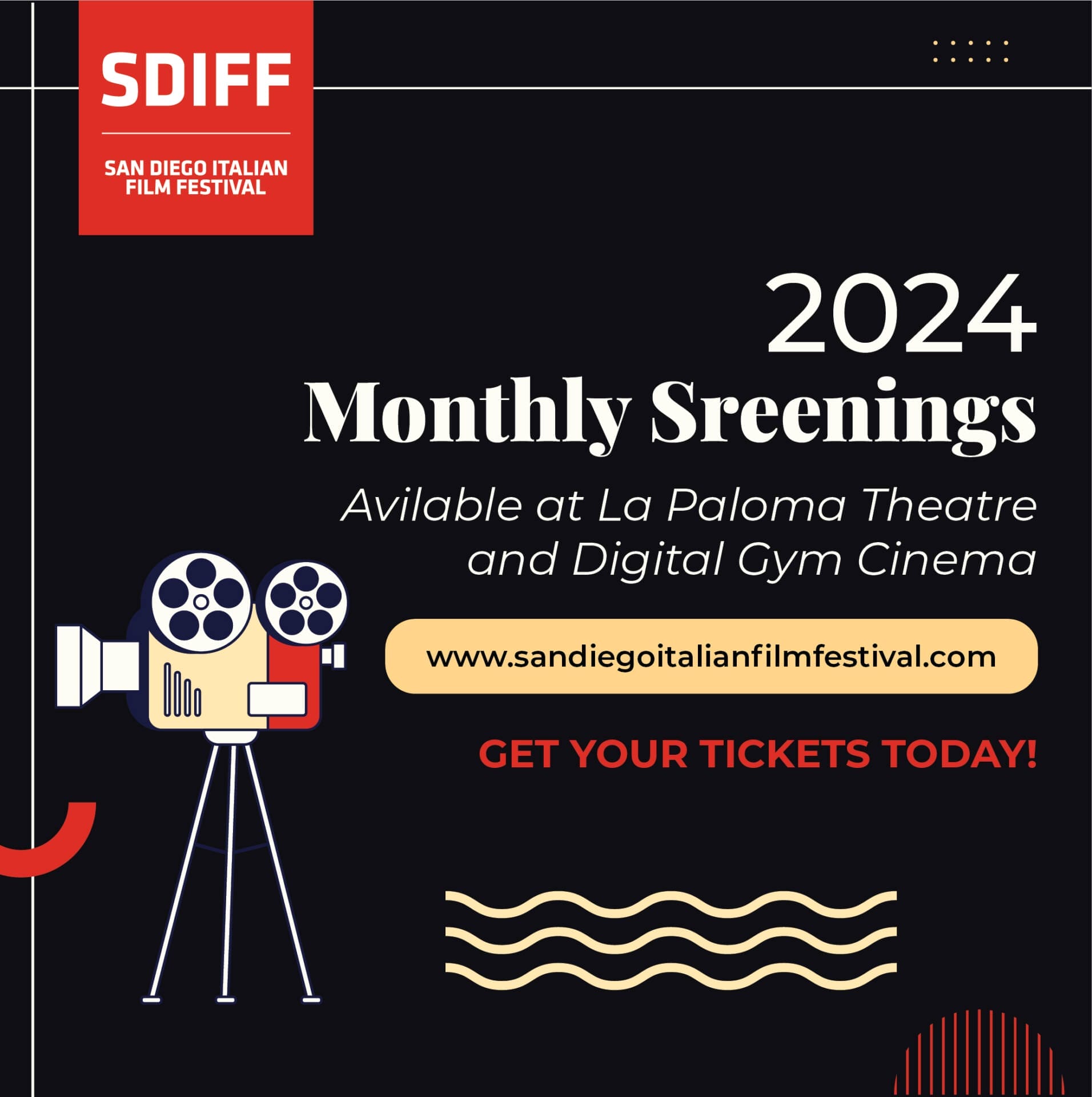We Get the Ending We Deserve: A Review of Diversionary Theatre’s Lizard Boy
Article by Celia Gold
Lizard Boy: The Musical’s success stems from the ways in which it emphasizes, even prioritizes, the concept of plurality. Itself a genre-bending amalgamation, Lizard Boy probes the complexity and necessity of negotiating various subjectivities in a contemporary rock musical rife with comic book tropes and elements of Classical Greek mythology. Its skillful oscillation between heart and head; its ability to maintain momentum and audience engagement while featuring a total of three performers; and its emphasis on plurality equally as a mechanism for social survival and as a catalyst to self-understanding and –acceptance are among its main achievements.
Playwright Justin Huertas, who also plays the eponymous hero, touches on the impetus for the show’s creation in a note that summarizes one of its primary lessons: “I wanted to create a hero who always thought that the color of his skin was a wall but instead learns that it’s a door.” Indeed, identity plays as large a role as each of the three cast members, Kirsten Delohr Helland (Siren) and William A. Williams (Cary) in addition to Huertas’ Trevor, undergo their own arc.
While each character scales the summit of living in a delimiting world differently, the ways that they interact with each other on their journeys reveal much of what Huertas aimed to convey…and opened the door for reflection on the ways in which we are, or might be, accountable to each other along the way. Lizard Boy examines what it means—and how it feels—to be an outsider both implicitly and explicitly. Huertas infuses the show with palpable moments foregrounding the pain of alienation derived from being an outsider in an already marginalized population. When the comical Cary explains that his forwardness (answering the door conspicuously absent one pair of pants) is a reaction to pressure to conform to the ubiquitous stereotype of the sexually promiscuous and less-than-selective gay man—rather than an expression of personal desire—it’s impossible not to feel a pang. Cary’s intrinsic failure to meet social expectations dictating how and with what frequency he should want to have sex encapsulates the ways in which normativity, whether via white supremacy, gender-, hetero-, or homonormativity, shapes the paths we walk. Lizard Boy goes one further by holding space for the weird weirdoes, those of us who will never, try as we might, be masculine enough, feminine enough, gay enough, straight enough, or the right kind of queer, and lets the audience in on a truth many suspect but few experience the gift of having confirmed: there are far more folks falling asleep at night wondering how to contort themselves into inherited social molds than not.
The ways in which we struggle in, through, and against inherited narratives is perhaps best embodied through the leitmotif of blood, invoking a range of histories from HIV/AIDS transmission narratives, the sex negativity they engendered and the ways in which those have been resisted from Act Up to the present. Blood’s ability to change us plays a dominant role as a common denominator filled with objective nuances and acting on the body in multivalent ways, including to heal it.
Contrasting Cary’s hypochondriases (“You kissed me…with blood…in your mouth?!”) is the bloodthirsty Siren, who lures audiences in from her very first song in which Helland sings from the liminal space between chest and head voice, spinning romantic lamentations like a lovechild of Alison Moyet and Jeff Buckley. Equally seductive as sinister, Siren is the epitome of the modern villain, justifying destruction for what they deem to be the greater good. She is a villain uncomfortably recognizable in her embodiment of the difficulties of cultivating proper allyship to folks experiencing forms of oppression not accessible to the would-be ally, who is perhaps also implicated in the system perpetuating suffering.
Lizard Boy, on view through October 30th, merits a trip to Diversionary Theatre not only for its sociopolitical exigency, but for the ways in which it treats it subjects with care and levity. Go see it if for no other reason than Siren is right: in one of her first lines, topical in more ways than one and eerily prophetic given our current climate, she deadpans, “The world could end tomorrow. Might as well listen to some music.”




